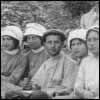By the Grace of G‑d
19th of Kislev, 5740
[December 9, 1979]
Brooklyn, N.Y.
Greeting and Blessing:
This is to confirm receipt of your letter of Nov. 9th, received with considerable delay.
Needless to say, it is difficult for me to go into the specific aspects of a situation overseas. However, knowing personally the people in charge of the Lubavitcher organization in your country and city, their dedication to service and their concern for the best interests of the community they serve, I am confident that a candid personal discussion with them will bring about the proper solution, one that will be doubly good—tov lashomayim v’tov labriyos [good towards G‑d and good towards mankind].
I am impelled, however, to take a position in regard to one point in your letter which is almost independent of the issues. I refer to your basic premise that “South African Jewry is a dwindling community.”
To be sure, going by bare statistics, the statement reflects the situation as it is at this moment. However, the mere fact of an existing situation need not be accepted as irreversible, hence to be dealt with accordingly. There are situations in our present day and age which call for a contrary response, in an all-out effort to reverse the trend. That this approach is both right and effective has been borne out by experience in similar situations in the U.S.A. and other countries, where the tide of dwindling communities and dwindling neighborhoods has not only been arrested, but also reversed, with notable success, though varying in degree.
With all due respect to your expertise and intimate knowledge of the S.A. Jewish community, I must take issue with your premise that a dwindling Jewish community must inevitably curtail its educational facilities. In most Jewish communities, including JHB [Johannesburg], there are hundreds of Jewish children who are going astray and on the road to total assimilation for lack of adequate Jewish education. They constitute an untapped reserve, for whom existing facilities should not only be sustained, but also expanded.
As for the quality of Jewish education, there is surely no need to point out to you that in order to achieve its purpose, Jewish education must be in keeping with the basic principle enunciated by the Wisest of All Men, King Solomon, who counseled: “Educate the lad according to his way, so that when he grows old he will not depart from it.” (Proverbs 22:6)
In other words, whatever the advantages of a uniform educational system may be, or one that is limited to two or three streams at the most, it cannot compensate for the overriding benefits of a diversified system reflecting the pluralistic nature of most communities in our present day and age, and offering the best possible and most natural appeal to every child individually.
Virtually every Jewish community, including S.A. Jewry, comprises a variety of groups, each with a distinct identity in terms of ancestral heritage and traditions, as exemplified also in different synagogues, with different rites and customs, such as Ashkenazic, Sephardic, Yemenite, etc. All of them existing and flourishing side by side contribute to the advancement of the Jewish community as a whole. It is within this frame of educating the lad “according to his way” that Jewish education can succeed most—provided, of course, the basics of Torah education, common to them all, are upheld.
You surely know that Gedolei Yisroel [Jewish leaders] in all generations scrupulously upheld the validity of tradition in regard to the Nusach of Tefillah [versions of the prayers], tracing its variety to the original Twelve Tribes of Israel.
A case in point: When Lubavitch came to North Africa and established there Yeshivos and educational institutions, my predecessor, my father-in-law of saintly memory, who initiated the broad program, gave clear directives not to encroach upon the customs and rites of the local Jewish communities, though for themselves the Lubavitch personnel had their own Minyan to follow their own Nusach. This approach immediately won the trust of the community leaders and had a salutary effect on the success of the educational process.
Needless to say, parents are free to choose the type of school they prefer for their children, and even change their Nusach. But it must be voluntary. Experience has shown that whenever a uniform educational system has been imposed on a multi-faceted community, it inevitably proved disastrous.
I have expanded somewhat on the subject of Jewish education, because I believe that the principles outlined above are universal in their application, and may be helpful to clarify the issues. This is all I can say from a distance, especially since I am convinced that a heart-to-heart discussion can easily solve the problem, if there is one, as mentioned above. All the more so, in view of the fact that all parties are sincerely concerned for the best interests of the community.
In light of the above, the most practical purpose of my writing is what follows next, and this, too, pertains to the problem of S. African Jewry being a dwindling community, to quote you again.
Before concluding this letter, permit me to turn my attention, and yours, to another aspect of the problem of South African Jewry as a “dwindling community.” Though this aspect is independent of the subject matter of your letter, it has serious implications far beyond the state of the community itself, and I would be remiss if I were not to take this opportunity of bringing it to your attention.
As you know, the RSA is one of the very few remaining friends of the Land of Israel in the present international arena. While common interests are, of course, important factors in international relations, there can be no doubt that the South African Jewish community and its leaders have had a significant part in developing and fostering this good relationship.
Needless to say, a healthy, vigorous and flourishing Jewish community is required in order to exert maximum influence on the government, and clearly, such influence is bound to suffer if the community is allowed to dwindle, whether physically or spiritually, or both. Hence, if there is still a dwindling trend, it must be halted, and indeed reversed. I hope and trust, therefore, that if any communal leader, or influential member of the community, or any Jew with roots in the South African community contemplates leaving it, they will seriously reconsider it, bearing in mind the impact not only on the community itself, but also how it would affect their fellow Jews everywhere, and in Eretz Yisroel in particular, inasmuch as כל ישראל ערבים זה בזה [all Jews are responsible for one another].
Closer to home, the South African Jewish community must surely be aware of its impact on neighboring smaller Jewish communities, particularly in Rhodesia, where despite recent erosion there is a firm determination to maintain a viable and normal Jewish existence and development. Obviously, the future of the South African Jewish community will have a great impact on these, as well as more distant Jewish communities faced with similar problems.
There is surely no need to elaborate to you on the above vital points.
With esteem and blessings,







Start a Discussion